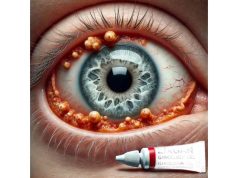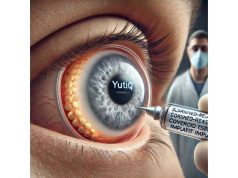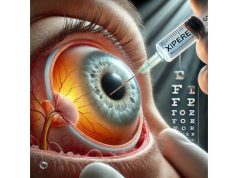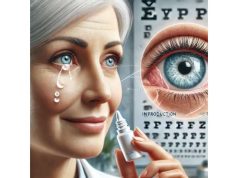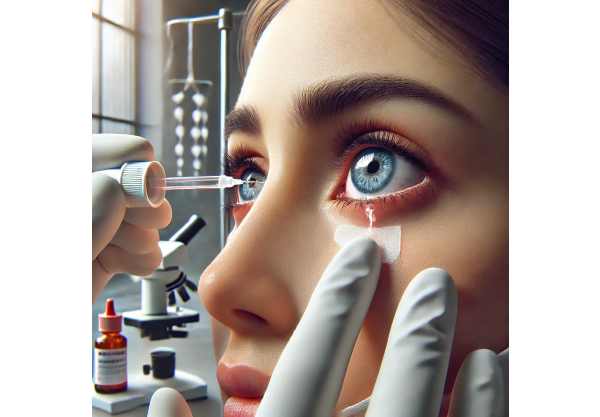
Herpes simplex keratitis is a common but potentially vision-threatening eye condition caused by infection with the herpes simplex virus (HSV). It can affect anyone, leading to recurrent symptoms and even corneal scarring if not properly managed. Understanding the available treatments—from tried-and-true antiviral medications to advanced surgical procedures and the latest breakthroughs—empowers both patients and clinicians to make informed decisions. In this comprehensive guide, let’s explore the entire landscape of herpes simplex keratitis management, practical advice for daily life, and promising innovations that may soon transform care for this challenging condition.
Table of Contents
- Condition Introduction and Epidemiology
- Medical Management and Traditional Therapies
- Surgical Options and Procedural Interventions
- Recent Breakthroughs and Next-Generation Approaches
- Ongoing Research and Anticipated Advancements
- Frequently Asked Questions
- Disclaimer
Condition Introduction and Epidemiology
Herpes simplex keratitis is the leading infectious cause of corneal blindness in developed countries. The condition stems from infection with the herpes simplex virus (HSV), most often HSV-1. After an initial exposure—often occurring in childhood—the virus remains dormant in the trigeminal ganglion and can reactivate years later, affecting the cornea. This reactivation leads to recurring inflammation, ranging from mild irritation to severe, sight-threatening disease.
Prevalence and Public Health Impact
Worldwide, herpes simplex keratitis affects millions of individuals annually. It accounts for a significant proportion of corneal transplants due to scarring and vision loss. The recurrence rate is notably high: up to 40% of patients may experience at least one relapse within five years of their initial episode. Anyone can develop the condition, but those with weakened immune systems or a history of HSV infections are at higher risk.
Risk Factors and Vulnerable Populations
Several factors increase susceptibility:
- Previous HSV eye infections
- Immunosuppression (due to medications, HIV, or other causes)
- Ocular trauma or surgery
- Use of topical corticosteroids
- Physical or emotional stress, which may trigger viral reactivation
Pathophysiology
HSV infection causes a range of corneal responses. Epithelial keratitis involves the outer corneal layer, while stromal keratitis affects deeper tissues, sometimes provoking an immune reaction that complicates treatment. Left unchecked, chronic inflammation and recurrent episodes can cause corneal thinning, neovascularization, and vision loss.
Living with herpes simplex keratitis often means remaining vigilant for early symptoms—such as pain, redness, light sensitivity, and blurred vision—and seeking prompt care to minimize complications. Ongoing education and practical strategies are essential for optimal disease control.
Medical Management and Traditional Therapies
For most individuals diagnosed with herpes simplex keratitis, conventional therapy centers on medical management, which remains the first line of defense against both acute episodes and recurrences. Let’s walk through the standard approaches, practical advice, and strategies that form the foundation of effective care.
Antiviral Medications
Antiviral agents are the cornerstone of herpes simplex keratitis treatment. The most widely used drugs include:
- Topical Acyclovir (3% ointment): Often prescribed five times daily for 10–14 days. This medication directly targets the virus at the site of infection.
- Oral Acyclovir: Usually dosed at 400 mg five times daily for 10 days in active disease, then tapered to a lower dose (400 mg twice daily) for long-term suppression.
- Alternative Agents: Valacyclovir and famciclovir are oral options with improved bioavailability and convenient dosing schedules.
Adjunctive Therapies
In addition to antivirals, management may include:
- Lubricating Eye Drops: To soothe irritation and protect the healing cornea.
- Cycloplegics (e.g., atropine): Used to relieve pain from ciliary muscle spasm and reduce the risk of synechiae (adhesions) in cases of deeper involvement.
- Topical Corticosteroids: Only used under strict ophthalmologic supervision, especially in stromal keratitis, to control inflammation. These are never used without concurrent antiviral therapy, as they can worsen the infection.
Key Principles for Medical Management
- Early treatment is crucial to prevent complications.
- Never self-medicate with steroids—always consult an ophthalmologist.
- Strict adherence to prescribed regimens improves outcomes and reduces the chance of recurrence.
- For patients with frequent recurrences, long-term prophylactic oral antivirals can dramatically reduce the risk of flare-ups.
Practical Self-Care Tips
- Avoid touching or rubbing the eyes.
- Wash hands frequently.
- Do not share towels or cosmetics to prevent spreading the virus.
- Wear sunglasses outdoors to reduce discomfort from light sensitivity.
Proper education and timely therapy empower individuals to manage their condition confidently and minimize disruptions to daily life.
Surgical Options and Procedural Interventions
While medical management controls most episodes of herpes simplex keratitis, some cases progress despite best efforts, making surgical or procedural intervention necessary. Let’s explore the situations when these options are considered and the range of available techniques.
When Is Surgery Indicated?
- Persistent or non-healing corneal ulcers
- Progressive corneal thinning (risk of perforation)
- Dense corneal scarring that impairs vision
- Severe stromal or endothelial disease unresponsive to medications
Key Surgical and Interventional Techniques
- Amniotic Membrane Transplantation: This biological bandage promotes healing in persistent epithelial defects and non-healing ulcers.
- Corneal Debridement: Manual removal of infected epithelium to reduce viral load, usually paired with topical antiviral therapy.
- Penetrating Keratoplasty (Full-Thickness Corneal Transplant): Reserved for eyes with deep scarring or perforation. Success rates are good, but postoperative viral recurrence is possible, requiring close monitoring.
- Anterior Lamellar Keratoplasty: Partial-thickness transplant that replaces only the affected layers, preserving healthy corneal tissue.
- Laser Procedures: Excimer laser phototherapeutic keratectomy (PTK) can remove superficial corneal opacities and smooth irregular surfaces in select cases.
Minimally Invasive Approaches
- Tissue Adhesives: Used as a temporary sealant in small corneal perforations.
- Intrastromal Injections: Experimental use of antiviral agents or corticosteroids delivered directly into corneal tissue to control severe inflammation.
Practical Considerations Before Surgery
- Surgery is generally a last resort when other measures have failed.
- Preoperative control of active infection is essential to prevent graft failure or postoperative complications.
- Ongoing antiviral prophylaxis is often required after surgery to minimize the risk of recurrence.
Postoperative Care Tips
- Use all prescribed drops exactly as instructed.
- Attend all follow-up appointments—early detection of complications is key.
- Protect the eye from trauma or accidental rubbing.
Surgical intervention can restore vision and comfort in severe cases, but careful selection and diligent aftercare are critical for success.
Recent Breakthroughs and Next-Generation Approaches
The landscape of herpes simplex keratitis treatment is evolving rapidly, with innovative therapies and technologies on the horizon. In this section, let’s highlight the most exciting advances and how they might soon reshape care.
Gene and Cell-Based Therapies
- Gene Editing Tools (CRISPR/Cas9): Early-stage research is exploring how targeted gene editing can disrupt viral replication or latent infection in corneal cells.
- Cell Therapy: Stem cell–derived corneal cells may help restore damaged tissue and reduce scarring in chronic disease.
Novel Antiviral Agents
- Long-Acting Antivirals: New formulations promise less frequent dosing and better patient adherence.
- Targeted Nanomedicine: Drug delivery systems that release antivirals precisely where needed, reducing side effects and boosting effectiveness.
Biologic Implants and Regenerative Materials
- Bioengineered Corneal Substitutes: Synthetic or tissue-engineered grafts may one day reduce the reliance on donor tissue and lower rejection risk.
- Collagen Cross-Linking (CXL): Originally developed for keratoconus, CXL is being investigated as an adjunct therapy to strengthen the cornea in chronic or recurrent HSV disease.
Artificial Intelligence (AI) and Digital Health
- AI-Powered Diagnostic Tools: Machine learning algorithms can now analyze corneal images, helping clinicians distinguish HSV keratitis from other causes of corneal inflammation with greater speed and accuracy.
- Telemedicine Platforms: Secure video consultations and mobile apps empower patients to seek timely expert advice—crucial for early intervention.
Recent Trends (2023–2025)
- Surge in personalized medicine approaches, matching therapy to each patient’s risk profile.
- Growing interest in immunomodulatory therapies that boost natural viral resistance.
Real-World Advice
- Ask your ophthalmologist about ongoing clinical trials for new therapies—enrolling in a study may offer access to tomorrow’s best options today.
- Stay informed about digital health tools, which can make monitoring and follow-up more convenient.
With these innovations, the future of herpes simplex keratitis management is brighter than ever—offering hope for lasting remission and restored vision.
Ongoing Research and Anticipated Advancements
Scientific progress in herpes simplex keratitis continues at a steady pace, with numerous clinical trials and research initiatives underway. Here, we take a closer look at what’s on the horizon and what patients and clinicians can expect in the near future.
Current and Upcoming Clinical Trials
- Next-Generation Antivirals: Multiple studies are evaluating new compounds that offer superior efficacy and fewer side effects.
- Immunotherapy Trials: Researchers are testing vaccines and monoclonal antibodies designed to prevent reactivation or boost the immune response.
- Advanced Surgical Techniques: Trials are underway to refine minimally invasive grafting procedures and optimize outcomes with bioengineered corneal materials.
Key Focus Areas for Research
- Reducing Recurrence: Ongoing studies aim to identify the most effective strategies for long-term suppression of viral activity, including combination therapies and immunomodulation.
- Improving Diagnosis: Efforts are being made to develop faster, more accurate point-of-care tests that can distinguish HSV keratitis from other causes of eye redness and pain.
- Enhancing Access: Telemedicine and remote monitoring are being evaluated for their ability to improve care, especially in underserved regions.
What to Expect in the Next Few Years
- Introduction of safer, more potent antiviral agents.
- Wider use of AI-assisted diagnostics in everyday clinical practice.
- Breakthroughs in personalized care, matching treatments to individual genetic and immunologic profiles.
How Patients Can Get Involved
- Consider joining a clinical trial—ask your eye care provider about opportunities.
- Stay connected to reputable eye health organizations for news on emerging therapies.
The path forward is promising, with collaborative efforts between researchers, clinicians, and patients driving rapid progress in the prevention and management of herpes simplex keratitis.
Frequently Asked Questions
What is the best treatment for herpes simplex keratitis?
The best treatment is early initiation of antiviral medications—such as topical or oral acyclovir—under the guidance of an eye specialist. Treatment is tailored to the severity and location of the infection, sometimes combined with lubricating drops and, for certain cases, careful use of topical steroids.
Can herpes simplex keratitis be cured completely?
While antiviral therapy can control and clear active episodes, the herpes simplex virus remains dormant in nerve tissue, meaning complete eradication is not currently possible. Ongoing management helps reduce flare-ups and preserves vision.
Is herpes simplex keratitis contagious?
Herpes simplex keratitis itself isn’t directly contagious between people, but the herpes simplex virus can be spread by direct contact. Good hand hygiene and avoiding eye rubbing help prevent transmission.
How can I prevent recurrences of herpes simplex keratitis?
Daily use of low-dose oral antivirals may prevent recurrences, especially for those with frequent flare-ups. Managing stress, protecting eyes from trauma, and avoiding unnecessary steroid use are also important strategies.
What are the long-term effects of herpes simplex keratitis?
Repeated episodes can lead to corneal scarring, thinning, or vision loss. Early treatment and preventive therapy minimize these risks and help maintain good vision over time.
Can surgery restore vision lost from herpes simplex keratitis?
Yes, surgical procedures such as corneal transplantation can often restore vision lost due to scarring or severe damage. Outcomes are best when active infection is controlled and appropriate postoperative care is followed.
Are there any new treatments available for herpes simplex keratitis?
Emerging therapies—including long-acting antivirals, gene editing, and AI-assisted diagnosis—are under investigation and may become widely available in the coming years. Ask your ophthalmologist about ongoing clinical trials.
Disclaimer
The information presented in this article is intended solely for educational purposes and should not be considered a substitute for professional medical advice, diagnosis, or treatment. If you have questions about your health or symptoms, always consult a qualified healthcare provider.
If you found this guide helpful, please consider sharing it on Facebook, X (formerly Twitter), or any platform you prefer. Your support helps our team continue creating high-quality, accessible health resources for everyone. Don’t forget to follow us on social media for the latest updates—together, we can spread awareness and empower more people to take charge of their eye health!


